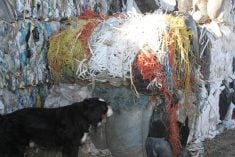The Canadian Farm Writers Federation is marking its 70th anniversary this year, and its founding members’ legacy can still be felt today.
Ron McCullough, who died in May, was the last surviving member of the group that formed the organization during an Agricultural Institute of Canada annual meeting in Edmonton on June 20, 1955.
He rubbed shoulders with the likes of Tom Leach (CBC), Dick Beamish (Western Producer), Jack Cram (Family Herald), Frank Jacobs (Canadian Cattlemen) and Don Baron (Country Guide).
Born in Lacombe, Alta., in 1932, McCullough completed his agriculture degree at the University of Alberta in 1954.
Read Also

Phosphate prices to remain high
Phosphate prices are expected to remain elevated, according to Mosaic’s president.
He found work shortly after graduating as the farm radio director for the Alberta Federation of Agriculture. Seven short months later, he was working for CFAC Radio in Calgary, covering southern Alberta with his daily farm broadcasts.
In 1957, United Grain Growers and CFAC sponsored McCullough to take an 80-day world tour to compile radio reports of Canada’s contribution to the Colombo Plan, which was intended to foster economic and social development in Asia, including agriculture.
“Ag journalism is really important right now because of all the misinformation of the activism going against certain aspects of agriculture. Good story telling and good research being explained would really help people understand where their food comes from,” said McCullough’s widow, Brenda.
“Look at the technology they have now and the products for soil health that have improved since back then.”
The world tour did take a toll on McCullough. He contracted yellow fever and had to quit his CFAC position, taking four months to recover.
That did not slow down his informative spirit, however.
He bought a small Piper aircraft in the summer of 1959 with a classmate who was studying for his MBA, and they flew it throughout South America, financed by the sale of written and broadcast news reports.
McCullough graduated from the Ivey School of Business in London, Ont., and returned home to help his family’s registered Angus business for a decade.
Despite all his farming responsibilities, he served on Red Deer city council and was chair of the Westerner Exposition.
His agricultural influence did not end there, as he worked until 1974 as assistant commissioner with the Canada Grain Commission for the Alberta area.
McCullough then worked for the federal department of regional economic expansion for six years, where as Alberta’s director general he saw nearly $25 million ($200 million in today’s money) dispensed in regional grants.
A stint with Suncor in government affairs followed before he returned home to Red Deer in 1984 to manage the family’s Angus herds after his father passed away and to assist with the dispersal of the cattle interests.
McCullough was awarded an honourary life membership in the Alberta Farm Writers Association, where he once served as president.
As well, the McCullough name is still visible at the University of Alberta, where a reading room was named after the family in the restored University Commons building.
The family’s involvement with the university started with Ron’s parents, Mac and Mattie, and includes the Lillian McCullough Breast Cancer Research Chair (named after Ron’s first wife) at the university’s Cancer Research Institute of Northern Alberta.
An ambitious agriculture initiative was to help create the Centennial Dutch Endowment Travel and Experiential Learning Award, which endows yearly scholarships to students in the university’s Faculty of Agriculture, Life and Environmental Sciences.
It gives students an opportunity to study and learn at the world renowned Wageningen University in the Netherlands.
“Hopefully, we can practise some of the things they do in the Netherlands,” Brenda McCullough said about the country, which ranks second globally in agricultural exports.
“How do they do that in that little postage stamp of a country. What Silicon Valley is to technology, Wageningen University is to agriculture as the top ag university in the world. Hopefully, it helps bring some of the technology and knowledge back into Alberta.”
Ron McCullough also donated funds to the AFWA for legacy projects to raise awareness and educate high school and post-secondary students about careers in agricultural journalism and communications.
Tracey Feist, current secretary for the AFWA, confirmed the organization is trying to work with the U of A to build a certificate program that would cover off areas of agricultural journalism, communications and broadcasting, which McCullough helped trail blaze.
Feist recently helped organize farm tours for writers and the general public in Saskatchewan and Alberta as part of a AFWA/SFWA joint venture in June.
It reinforced the message Feist repeated at a speech at the International Federation of Agricultural Journalist Conference in 2023, passing on the words of one of the original CFWF founders, Tom Leach of CBC:
“We foresaw the improving influence we could have on the quality of farm reporting, how we could encourage more intellectually minded students to enter the field of farm journalism, and we could even imagine that our influence might help establish suitable training centres in the agricultural colleges where aspiring writers could receive adequate instruction in the art of research and reporting, either by radio or TV or press.”















